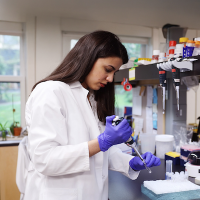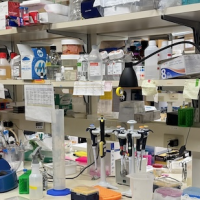
Scientists still aren’t sure exactly what causes endometriosis, but recent research suggests that the suppression of certain genes may contribute to the disease. Now, researchers from Yale University are using this finding to create a novel treatment for endometriosis that is both non-invasive and non-hormonal.
Our DNA is the roadmap of our health, and gene expression helps our bodies figure out the exact route to take. We all have a plethora of genes—about 24,000 by some estimates—but whether or not these genes are “turned on” determines if they affect our health. Yale scientists figured out that the microRNA let-7b, which controls specific gene expression, is repressed in women with endometriosis.
After that lightbulb moment, the team hypothesized that administering let-7b to patients with endometriosis could help to treat the condition.
In a recent study, Yale scientists gave mice purposely engineered to develop endometriosis either an injection of let-7b or a placebo. (Lead researcher, Ramanaiah Mamillapalli, of Department of Obstetrics, Gynecology and Reproductive Sciences at Yale University School of Medicine, tells The Blossom that although monkeys are the ideal animal model to study endometriosis, mice models allow researchers to better analyze the abnormal changes caused by the disease, such as the formation of lesions.)
RELATED: Dogs, Pigs and Sheep, Oh My! What We Can Learn About Endo in Animals
Two weeks after the initial injection, the scientists observed that mice that were given the experimental treatment had reduced endometriosis lesion size and decreased gene expression in several genes known to promote endometriosis.
If this gene therapy proves to be effective in humans, it could provide a non-hormonal, non-surgical treatment for endometriosis. Mamillapalli says that he envisions creating a synthetic version of let-7b that can be administered to patients via an injection straight into the abdomen.
Although the idea of manipulating genes to control health may sound futuristic, the concept isn’t so far-fetched. Gene therapies such as this have already been proven useful for the treatment of certain cancers since 2013.
Current options for either treating and managing endometriosis, respectively, involves two choices, invasive excision surgery, and expensive hormone therapy. However, doctors believe there may be better ways to help the one in 10 women worldwide living with this painful condition.
“Scientists are looking for non-surgical treatments for endometriosis,” adds Mamillapalli. “This [the experimental gene therapy] is the one that could help.”
There is also a dire need for non-hormonal management for endometriosis.
RELATED: All Birth Control Pills Aren't Created Equal in Managing Endometriosis, Say Experts
Endometriosis is an estrogen-dependent disease, meaning it needs estrogen to progress. Current endo management options involve drugs that suppress estrogen production. However, these drugs have side effects ranging from weight gain to hair loss and headaches. Also, they are not useful for women trying to conceive. The Yale scientists claim their proposed gene treatment has none of the adverse side effects associated with hormone therapy.
Of course, the experimental treatment still needs further research before it can even be tested on humans and until that happens, it’s not clear if the same positive results can be replicated.
Mamillapalli declined to comment on what the next step in their research is on this promising treatment option, but we’ll likely hear more about gene therapy in endometriosis news to come.









